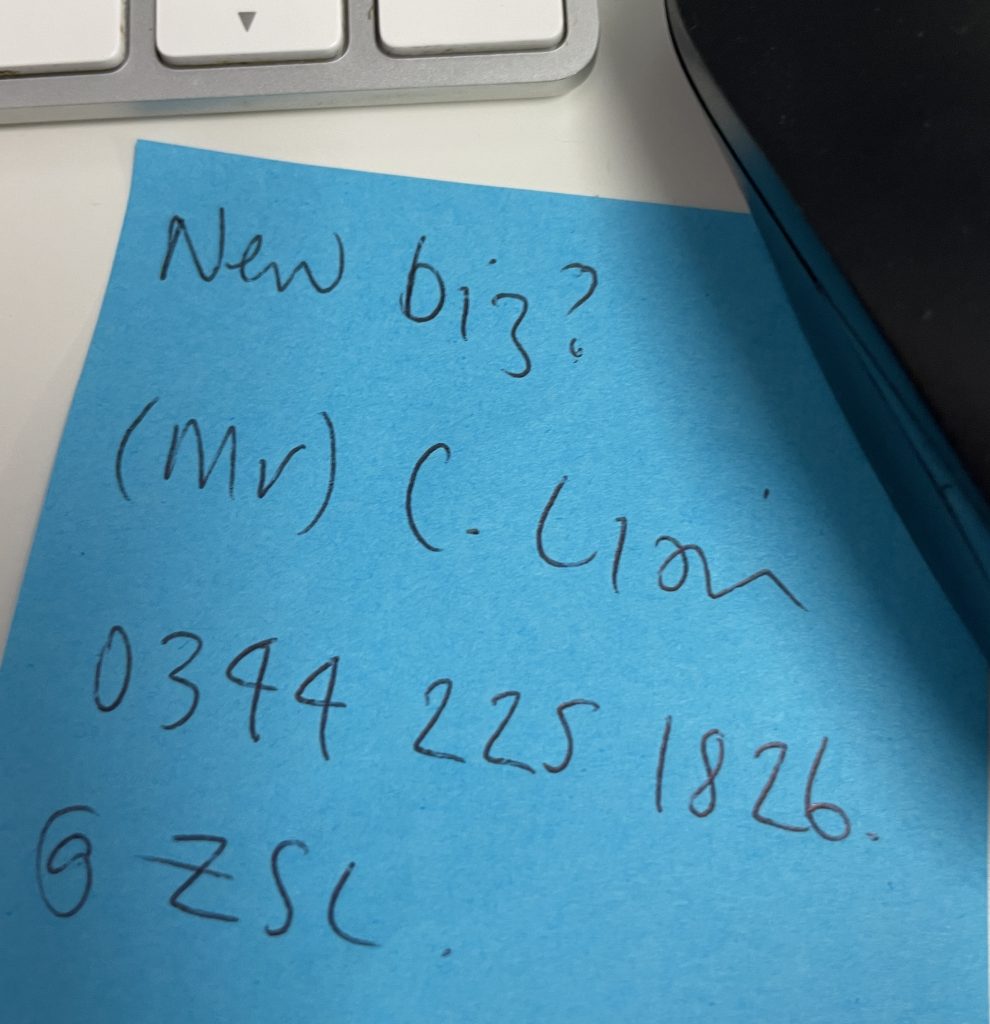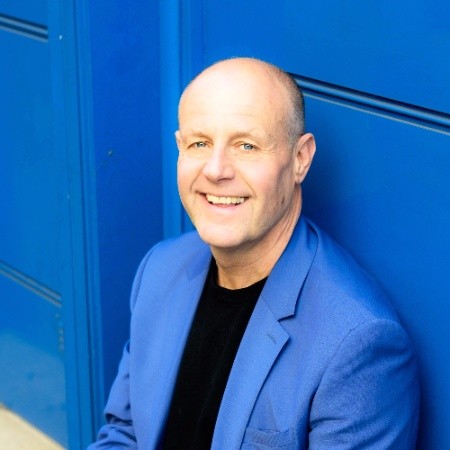It would be hard to be more effusive about having Adrian Day as the virgin writer of our new blog series: Friendly Advice : )
Family (and friends) have built a 15-year strong business on making friendships the most important business tool we have. Be it the friends who helped us set up in the first place, the ones we work with to deliver great work, or the ones who gave us assignments; and of course, the ones others call ‘clients’ that we refer to as ‘friends’ – because great brands are built on great relationships.
We trust that good friends offer the best advice, so we decided to ask Adrian (wearing the 1360 number in our feature picture), a seasoned brand marketing and communications expert, who more recently has been advising firms in the creative sector on growth, business building and ‘work-wellbeing’.
We’ve known this often self-abasing, yet sharp-witted and clever man for a long time, way back from our years at Siegel & Gale and Landor Associates as creative twiglets. He always came across as the slightly older brother offering good counsel, as well as some good put downs.
And so, given carte blanch to write whatever he may think useful, here is his wonderful advice on how to navigate life Top Ten Top Tips from a 66 year young self to a 33 year old self – or maybe YOU in fact?
Here’s Adrian’s advice…
“Advice on careers and work is ten a penny – LinkedIn delivers a live-stream of homilies, platitudes and blogs.
Here are ten random tips from a 66 year old to someone half my age working in marketing, design or communications.”
The tips aren’t supported by documented evidence, instead they’re based on what I’ve seen, felt and heard over 40 years of working (ish – see below).
No 1. Right writing.
Despite the ubiquity of text speak, emoji’s and Tikety Tik Toks, people in organisations do need to be able to communicate in writing. The writing process helps you develop, order and challenge your thoughts. So take a writing course of some sort. It’ll pay itself back many times. PS Avoid jargon and acronyms if you can; they rarely make you look as clever as you think they do.
No 2. Money makes the world go round.
Sadly ‘money’ isn’t taught at most schools or colleges. Yet it’s our main unit of exchange and much of life is about exchanging things, time and ideas. So learn about budgeting, managing costs, and getting fair value for something. Just a rudimentary knowledge of forecasting, profit and loss accounting and balance sheets will help you immeasurably whatever you do (in lieu of this marry an accountant).
No 3. You’re an imposter.
Imposter syndrome is pervasive (I’m still wondering what I’ll do when I grow up). More people than you think believe they shouldn’t really be doing the job they do and don’t deserve to be promoted. In my experience many of the very best people have imposter syndrome of some sort.
“Use social media to link with everyone you meet, whatever their walk of life.”
No 4. Connect up.
Grow the universe of people you know. The most unlikely people can be allies, supporters, useful experts, business partners and friends. Use social media to link with everyone you meet, whatever their ‘walk of life’. Oftentimes you’ll be wondering why you’re having that Flat White meeting – yet they’re the ones that often lead to something. And not much lost if they don’t – connection is good for us all.

No 5. Funtime.
I had too much fun in my twenties as an account manager (really not sure what I did most of the time but I remember the Old Bell more than the Office). Not a great example, but life is about balance so enjoy your job, smile and make time for humour. Offices and studios I visit now are so quiet – unless I’m missing all the virtual laughs and japes (I’m not).
No 6. Income streaming.
Falling into the ‘easier said than done’ bucket is my advice to have more than one source of income. Even small amounts from different sources add up – a few hundred pounds a month from selling your unwanted tat on eBay, a side hustle (Bonus top tip – avoid use of word ‘hustle’) or interest from savings. Yes your main job should be the focus but other streams can add up – and help in the event of losing your day job (though try not to do that).
“I don’t think I’d heard of emotional intelligence ’till half way through my career.”
No 7. Intelligent emotions.
I don’t think I’d heard of ‘emotional intelligence’ ’till half way through my career (and I could still do with another ‘helping’). I wish I had because in the 80s and 90s it was in short supply. The working world seems better balanced now – so value emotional intelligence in yourself and others.
No 8. Get lost.
I didn’t manage this, but having a sabbatical every tenth year must be hugely valuable. Having a break from work, widening horizons, travelling, doing different things or even nothing can help both you and your quality of work on returning. Marketing and communications exists in the real world so having quality time in that world is important.
No 9. Hybrid is good (thank you pandemic).
If there’s one regret (I have a few) it’s that hybrid working wasn’t around much when I worked full-time. Crowding onto the 8.06 to Finsbury Park to sit in an office five days a week never made much sense to me.
Equally no days in the office would’ve meant missing out on valuable interactions, all the benefits of serendipity and opportunities to leave London Zoo’s number on your colleague’s desk with a note to call Mr C. Lion. Some tasks are best done solus, others need collaboration.

No 10. You can’t be serious.
Of course much of the above could be irrelevant or redundant for you. I have no insight into your personality, work/life context, strengths or areas for improvement. You might have done everything on the list (in which case well done and sorry for wasted screen time). The best way to avoid that is to have an open conversation with a coach, mentor or adviser – so advice is customised to you.
“It took 65 years but what seemed ridiculously impossible in my thirties wasn’t at all…”
No 11 (Bonus tip ) ‘It’s never too late’.
I did very little sport at school or beyond, hiding behind the bike shed because ‘I wasn’t good enough’. Then ten years ago in my mid-Fifties I finished quickly in an otherwise pedestrian Parkrun. A friend sardonically suggested sprinting. I joined a club, trained hard, ate the right food and drink and avoided (most of) the worst.
I entered local, then national and then international masters events, doing OK but not setting the world alight. Last year I entered a new age group and won a gold medal for GB’s masters’ 400m mixed relay team in Italy. And this year I surprised myself to become age group national champion in both the indoor and outdoor 400m. It took 65 years but what seemed ridiculously impossible in my thirties wasn’t at all. Off to Florida for the world masters champs next year….
More about Adrian
Adrian has over 40 years’ experience working in and with marketing, communications and design organisations. Adrian has been advising firms in the creative sector for over ten years, helping founders and owners realise their ambitions.
If he’s honest he’s enjoyed the last ten years more than the first 30, but the former was needed for the latter (working a couple of days a week helps). A qualified Non-Executive Director with the Financial Times’ Post-Graduate Diploma, he holds an MBA from Middlesex University and the Chartered Institute of Marketing’s Diploma.
Adrian is also one of DBA’s (The Design Business Association) Expert https://www.dba.org.uk/experts/review-adrian-day/
